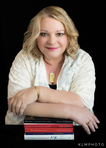Silence is golden, but the bridle is ironic
© Christy K Robinson
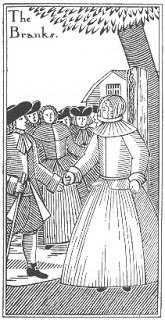 A woman with an iron bridle
A woman with an iron bridle
(called "branks" in Scotland)
on her head.
The 1650s were times of great upheaval in political andreligious circles. Englandhad still not recovered from the horrors of its Civil Wars of the previousdecade. Tens of thousands of men had died in the battles, from sickness more thanwounds; their women and children left at home were starving on the farms andmany left for the larger cities—where their fates were not much different in regard tostarvation and mortal illnesses. Several Christian sects, the Quakers foremostamong them, were heavily persecuted with excessive fines, imprisonment,beatings, brandings, and disfiguring ear removal.
William and Mary Dyersailed back to England inlate 1651 or early 1652, on business for Rhode Island. William went back to Rhode Island; Mary stayed in England. She stayed until early1657, and during those four years, became convicted of the principles of theFriends, who were "reproachfully" called Quakers. It's not known if Mary Dyer and Dorothy Waugh ever met in England, but they did meet in Rhode Island and Bostonin 1657 and 1658.
The young, unmarried Dorothy Waugh had been a housemaid in Preston Patrick, avillage in northwest Englandbetween Carlisle and Lancaster,and was a convert to the Quaker movement. There was a Friends group in thatout-of-the-way village: George Fox, during his journeysin the northwest, encountered a group of religious dissenters in the area knownas the Westmorland Seekers, and they were convicted of the gospel as Fox taughtthem. Fox allowed women to speak and preach. Most other schools of thought and theology were still blaming Eve for eating the forbidden fruit, and were holding her responsible for all humanity being driven from the Garden of Eden. Women were to keep silent not only in church, but in every public place.
Dorothy had little or no education, as only higher-statuswomen were taught to read and write. But she had enthusiasm and energy, and as some Quakers described it, the "fire and the hammer," andsoon she was giving her testimony and preaching the repentance of sinful ways,as she wandered England from London to Cornwall to Yorkshire.Quaker histories say that she was whipped and jailed numerous times all over England.Did she walk everywhere, travel with a group, or work her way through thecountryside for food and wagon rides?
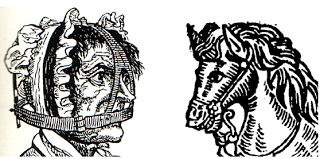 Not much is known of Dorothy's life outside of a fewincidents in England and New England, but she's famous for her description of whatit was like to be "bridled" or "branked." A bridle was a metal cage that waslocked over a woman's head, with a bit (possibly spiked) pressing down on her tongue so shecouldn't speak. It had been invented in medieval times to punish women whoscolded their husbands or otherwise disturbed the social order, and it was meant to reduce a woman's status to thatof a tamed farm animal. The ability to speak distinguishes humans from beasts,but with this apparatus, a woman was forced to be as silent ("dumb") as ananimal.
Not much is known of Dorothy's life outside of a fewincidents in England and New England, but she's famous for her description of whatit was like to be "bridled" or "branked." A bridle was a metal cage that waslocked over a woman's head, with a bit (possibly spiked) pressing down on her tongue so shecouldn't speak. It had been invented in medieval times to punish women whoscolded their husbands or otherwise disturbed the social order, and it was meant to reduce a woman's status to thatof a tamed farm animal. The ability to speak distinguishes humans from beasts,but with this apparatus, a woman was forced to be as silent ("dumb") as ananimal.
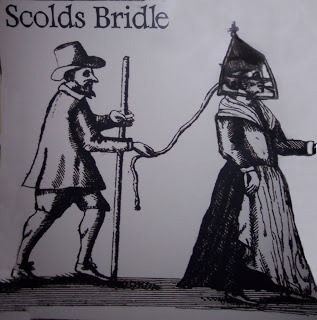 When a woman was bridled, she was led about the town on achain and whipped, or secured to the village cross, and was then open to theabuse of refuse or dung thrown at her, or of people urinating on her. Theinfliction of a bridle may reveal more about the men who did it than about thewomen who endured it: the men were insecure in their power when women claimeddivine revelation, interpreted scripture, or preached. They believed that womenwho stepped out of their appointed place brought chaos and God's judgment.
When a woman was bridled, she was led about the town on achain and whipped, or secured to the village cross, and was then open to theabuse of refuse or dung thrown at her, or of people urinating on her. Theinfliction of a bridle may reveal more about the men who did it than about thewomen who endured it: the men were insecure in their power when women claimeddivine revelation, interpreted scripture, or preached. They believed that womenwho stepped out of their appointed place brought chaos and God's judgment.
Dorothy had a taste of the bridle in 1655, in Carlisle, nearthe English border with Scotland.
"Dorothy Waugh, for declaring Truthin the Streets of Carlisle, and testifying against Sin and Wickedness, was,together with Anne Robinson who accompanied her, committed to Prison by theMayor, who ordered an Iron Instrument of Torture, called a Bridle, to be putupon the said Dorothy's Head, which they kept on about two Hours: And some timeafter having the like Iron Instrument put on both their Heads, which preventedtheir speaking to the People, they were publickly led through the Streets, andexposed to the Scorn and Derision of the Rabble, and then turned out of theCity." Source:AN ABSTRACT OF THE SUFFERINGS Of the PEOPLE call'd QUAKERS. FOR THE Testimony of a Good Conscience, Fromthe TIME of Their being first distinguished by that NAME, Taken from OriginalRecords, and other Authentick Accounts. VOLUME I. From the Year 1650 tothe Year 1660. LONDON: Printed and Sold by the Assigns of J.Sowle, at the Bible in George Yard, Lombard-street, 1733.
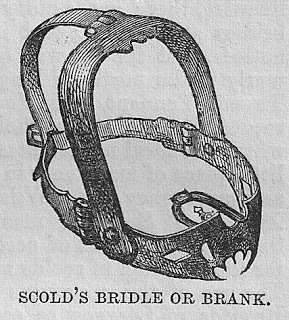 A year later, before Dorothy joined other Quakers on thetiny missionary ship, Woodhouse, onits voyage to New England to proselytize,Dorothy gave an account of her experience in a pamphlet anthology called The Lamb's Defence Against Lyes. (1656)
A year later, before Dorothy joined other Quakers on thetiny missionary ship, Woodhouse, onits voyage to New England to proselytize,Dorothy gave an account of her experience in a pamphlet anthology called The Lamb's Defence Against Lyes. (1656)
The [Carlisle] Mayor 'was so violent & full of passion that he scarce askedme any more Questions, but called to one of his followers to bring thebridle as he called it to put upon me, and was to be on three houres, andthat which they called so was like a steele cap and my hattbeing violently pluckt off which was pinned to my head [so her scalp was probably torn when the hat was yanked off] whereby they taremy Clothes to put on their bridle as they called it, which was a stoneweight of Iron [about 14 pounds], & three barrs of Iron to come over my face, and apeece of it was put in my mouth, which was so unreasonable big a thing forthat place as cannot be well related, which was locked to my head, and soI stood their time with my hands bound behind me with the stone weight of Ironupon my head and the bitt in my mouth to keep me from speaking; And theMayor said he would make me an Example... Afterwards it was taken off andthey kept me in prison for a little season [hours? days? weeks?], and after a while the Mayorcame up againe and caused it to be put on againe, and sent me out of theCitty with it on, and gave me very vile and unsavoury words, which werenot fit to proceed out of any mans mouth, and charged the Officer to whipme out of the Towne.'
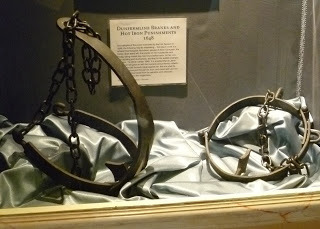 When Dorothy Waugh came to Rhode Islandand Massachusetts Bay in 1656, she partneredwith another missionary named Sarah Gibbons. They traveled on foot to Salem, Massachusetts,about 60 miles, and slept in the woods along the way, surviving a Marchblizzard and fierce winds. They were allowed to preach for two weeks without arrest; butdeciding it was too tame or too lax there, they went to Boston to "look your Bloody Laws in theFace." Once there, they were jailed for three days with no food, publiclywhipped (wherein they were stripped to the waist), starved for anotherthree days, then banished to Rhode Island.
When Dorothy Waugh came to Rhode Islandand Massachusetts Bay in 1656, she partneredwith another missionary named Sarah Gibbons. They traveled on foot to Salem, Massachusetts,about 60 miles, and slept in the woods along the way, surviving a Marchblizzard and fierce winds. They were allowed to preach for two weeks without arrest; butdeciding it was too tame or too lax there, they went to Boston to "look your Bloody Laws in theFace." Once there, they were jailed for three days with no food, publiclywhipped (wherein they were stripped to the waist), starved for anotherthree days, then banished to Rhode Island.
Dorothy and Sarah traveled to Hartford,Connecticut, were arrested and banished, and in1658, joined four other Quakers on a ship bound for Barbados, presumably to preachthere. But nothing is known of Dorothy after the late fall of 1658 in Barbados. Perhaps she married.Perhaps she died of illness or injury. Perhaps she was sold as a slave orbond servant. I suspect she died, because nothing else, including a barbarousbridle, could silence her when the cause of God was so precious.
 A woman with an iron bridle
A woman with an iron bridle (called "branks" in Scotland)
on her head.
The 1650s were times of great upheaval in political andreligious circles. Englandhad still not recovered from the horrors of its Civil Wars of the previousdecade. Tens of thousands of men had died in the battles, from sickness more thanwounds; their women and children left at home were starving on the farms andmany left for the larger cities—where their fates were not much different in regard tostarvation and mortal illnesses. Several Christian sects, the Quakers foremostamong them, were heavily persecuted with excessive fines, imprisonment,beatings, brandings, and disfiguring ear removal.
William and Mary Dyersailed back to England inlate 1651 or early 1652, on business for Rhode Island. William went back to Rhode Island; Mary stayed in England. She stayed until early1657, and during those four years, became convicted of the principles of theFriends, who were "reproachfully" called Quakers. It's not known if Mary Dyer and Dorothy Waugh ever met in England, but they did meet in Rhode Island and Bostonin 1657 and 1658.
The young, unmarried Dorothy Waugh had been a housemaid in Preston Patrick, avillage in northwest Englandbetween Carlisle and Lancaster,and was a convert to the Quaker movement. There was a Friends group in thatout-of-the-way village: George Fox, during his journeysin the northwest, encountered a group of religious dissenters in the area knownas the Westmorland Seekers, and they were convicted of the gospel as Fox taughtthem. Fox allowed women to speak and preach. Most other schools of thought and theology were still blaming Eve for eating the forbidden fruit, and were holding her responsible for all humanity being driven from the Garden of Eden. Women were to keep silent not only in church, but in every public place.
Dorothy had little or no education, as only higher-statuswomen were taught to read and write. But she had enthusiasm and energy, and as some Quakers described it, the "fire and the hammer," andsoon she was giving her testimony and preaching the repentance of sinful ways,as she wandered England from London to Cornwall to Yorkshire.Quaker histories say that she was whipped and jailed numerous times all over England.Did she walk everywhere, travel with a group, or work her way through thecountryside for food and wagon rides?
 Not much is known of Dorothy's life outside of a fewincidents in England and New England, but she's famous for her description of whatit was like to be "bridled" or "branked." A bridle was a metal cage that waslocked over a woman's head, with a bit (possibly spiked) pressing down on her tongue so shecouldn't speak. It had been invented in medieval times to punish women whoscolded their husbands or otherwise disturbed the social order, and it was meant to reduce a woman's status to thatof a tamed farm animal. The ability to speak distinguishes humans from beasts,but with this apparatus, a woman was forced to be as silent ("dumb") as ananimal.
Not much is known of Dorothy's life outside of a fewincidents in England and New England, but she's famous for her description of whatit was like to be "bridled" or "branked." A bridle was a metal cage that waslocked over a woman's head, with a bit (possibly spiked) pressing down on her tongue so shecouldn't speak. It had been invented in medieval times to punish women whoscolded their husbands or otherwise disturbed the social order, and it was meant to reduce a woman's status to thatof a tamed farm animal. The ability to speak distinguishes humans from beasts,but with this apparatus, a woman was forced to be as silent ("dumb") as ananimal. When a woman was bridled, she was led about the town on achain and whipped, or secured to the village cross, and was then open to theabuse of refuse or dung thrown at her, or of people urinating on her. Theinfliction of a bridle may reveal more about the men who did it than about thewomen who endured it: the men were insecure in their power when women claimeddivine revelation, interpreted scripture, or preached. They believed that womenwho stepped out of their appointed place brought chaos and God's judgment.
When a woman was bridled, she was led about the town on achain and whipped, or secured to the village cross, and was then open to theabuse of refuse or dung thrown at her, or of people urinating on her. Theinfliction of a bridle may reveal more about the men who did it than about thewomen who endured it: the men were insecure in their power when women claimeddivine revelation, interpreted scripture, or preached. They believed that womenwho stepped out of their appointed place brought chaos and God's judgment.Dorothy had a taste of the bridle in 1655, in Carlisle, nearthe English border with Scotland.
"Dorothy Waugh, for declaring Truthin the Streets of Carlisle, and testifying against Sin and Wickedness, was,together with Anne Robinson who accompanied her, committed to Prison by theMayor, who ordered an Iron Instrument of Torture, called a Bridle, to be putupon the said Dorothy's Head, which they kept on about two Hours: And some timeafter having the like Iron Instrument put on both their Heads, which preventedtheir speaking to the People, they were publickly led through the Streets, andexposed to the Scorn and Derision of the Rabble, and then turned out of theCity." Source:AN ABSTRACT OF THE SUFFERINGS Of the PEOPLE call'd QUAKERS. FOR THE Testimony of a Good Conscience, Fromthe TIME of Their being first distinguished by that NAME, Taken from OriginalRecords, and other Authentick Accounts. VOLUME I. From the Year 1650 tothe Year 1660. LONDON: Printed and Sold by the Assigns of J.Sowle, at the Bible in George Yard, Lombard-street, 1733.
 A year later, before Dorothy joined other Quakers on thetiny missionary ship, Woodhouse, onits voyage to New England to proselytize,Dorothy gave an account of her experience in a pamphlet anthology called The Lamb's Defence Against Lyes. (1656)
A year later, before Dorothy joined other Quakers on thetiny missionary ship, Woodhouse, onits voyage to New England to proselytize,Dorothy gave an account of her experience in a pamphlet anthology called The Lamb's Defence Against Lyes. (1656)The [Carlisle] Mayor 'was so violent & full of passion that he scarce askedme any more Questions, but called to one of his followers to bring thebridle as he called it to put upon me, and was to be on three houres, andthat which they called so was like a steele cap and my hattbeing violently pluckt off which was pinned to my head [so her scalp was probably torn when the hat was yanked off] whereby they taremy Clothes to put on their bridle as they called it, which was a stoneweight of Iron [about 14 pounds], & three barrs of Iron to come over my face, and apeece of it was put in my mouth, which was so unreasonable big a thing forthat place as cannot be well related, which was locked to my head, and soI stood their time with my hands bound behind me with the stone weight of Ironupon my head and the bitt in my mouth to keep me from speaking; And theMayor said he would make me an Example... Afterwards it was taken off andthey kept me in prison for a little season [hours? days? weeks?], and after a while the Mayorcame up againe and caused it to be put on againe, and sent me out of theCitty with it on, and gave me very vile and unsavoury words, which werenot fit to proceed out of any mans mouth, and charged the Officer to whipme out of the Towne.'
 When Dorothy Waugh came to Rhode Islandand Massachusetts Bay in 1656, she partneredwith another missionary named Sarah Gibbons. They traveled on foot to Salem, Massachusetts,about 60 miles, and slept in the woods along the way, surviving a Marchblizzard and fierce winds. They were allowed to preach for two weeks without arrest; butdeciding it was too tame or too lax there, they went to Boston to "look your Bloody Laws in theFace." Once there, they were jailed for three days with no food, publiclywhipped (wherein they were stripped to the waist), starved for anotherthree days, then banished to Rhode Island.
When Dorothy Waugh came to Rhode Islandand Massachusetts Bay in 1656, she partneredwith another missionary named Sarah Gibbons. They traveled on foot to Salem, Massachusetts,about 60 miles, and slept in the woods along the way, surviving a Marchblizzard and fierce winds. They were allowed to preach for two weeks without arrest; butdeciding it was too tame or too lax there, they went to Boston to "look your Bloody Laws in theFace." Once there, they were jailed for three days with no food, publiclywhipped (wherein they were stripped to the waist), starved for anotherthree days, then banished to Rhode Island. Dorothy and Sarah traveled to Hartford,Connecticut, were arrested and banished, and in1658, joined four other Quakers on a ship bound for Barbados, presumably to preachthere. But nothing is known of Dorothy after the late fall of 1658 in Barbados. Perhaps she married.Perhaps she died of illness or injury. Perhaps she was sold as a slave orbond servant. I suspect she died, because nothing else, including a barbarousbridle, could silence her when the cause of God was so precious.
Published on April 04, 2012 01:03
No comments have been added yet.

